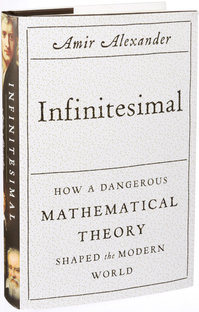Source of book image: http://static01.nyt.com/images/2014/04/08/science/08SCIB/08SCIB-superJumbo.jpg
(p. C9) Mr. Alexander’s narrative opens in the early 17th century, when Catholic Church administrators in Rome, following a campaign by Euclidean stalwart Christopher Clavius, banned the infinitesimal from the classrooms of Jesuit schools throughout Europe. Instructors’ teachings and writings were monitored to enforce strict adherence to the classical Euclidean geometrical tradition. Mr. Alexander portrays the church’s reactionary stance not as a huff over mathematical philosophy but as a desperate counterattack against existential threats: Euclid’s rules-based structure offered the church a model with which it hoped to rein in a restive flock, roiled by economic and political currents and by an ascendant Protestantism. Martial metaphors abound in the author’s telling: “war against disorder,” “enemies of the infinitely small,” “forces of hierarchy and order.” This was no friendly debate.
For the full review, see:
ALAN HIRSHFELD. “The Limit of Reason; In the 1700s, the idea of an infinitely tiny quantity was so unsettling that the Church banned it from classrooms.” The Wall Street Journal (Sat., May 3, 2014): C9.
(Note: ellipses added.)
(Note: the online version of the review has the date May 2, 2014, and has the title “Book Review: ‘Infinitesimal’ by Amir Alexander; The idea of an infinitely tiny quantity–the foundation of calculus–was so unsettling that in the 17th century the Church banned it from classrooms.”)
The book under review is:
Alexander, Amir. Infinitesimal: How a Dangerous Mathematical Theory Shaped the Modern World. New York: Scientific American/Farrar, Straus and Giroux, 2014.

